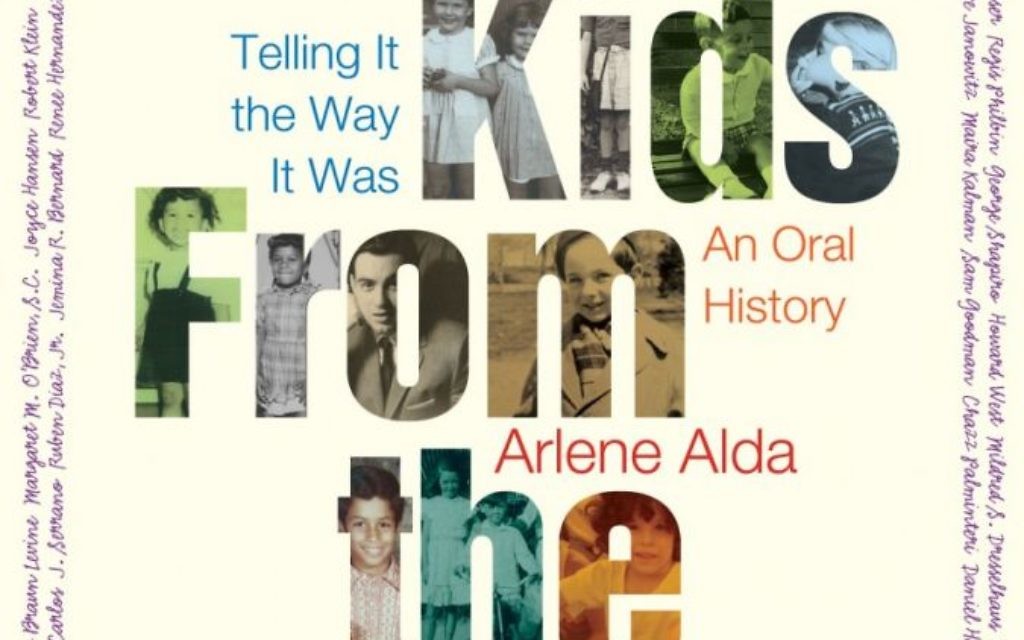‘Just Kids From the Bronx’ Recalls Borough’s Ups and Downs
Arlene Alda’s new book, “Just Kids From the Bronx,” is an oral history of the borough spanning seven decades, narrated by people who grew up there and went on to lead significant lives, such as Carl Reiner, Mary Higgins Clark, Al Pacino and Colin Powell.
The author will appear at the Book Festival of the Marcus Jewish Community Center on Sunday, Nov. 15, accompanied by her husband, actor Alan Alda, himself a former keynote speaker at the festival.
She spoke to the AJT by phone.
Get The AJT Newsletter by email and never miss our top stories Free Sign Up
AJT: What did you want to achieve with this book?
Alda: My goal was, oddly enough, not one of nostalgia. It was one of recalling memories. Some of them may not have been nostalgic at all. Some are quite painful. It was basically to go through the decades to give a picture of how things changed and what things were like for that particular person who lived in that particular decade. That was the ultimate goal.
AJT: You’ve got the dark side of the Bronx in there as well. It’s not all fun and games.
Alda: That’s very important because it’s really a book of suppressed stories and of rising from whatever position you found yourself in as a kid and, beyond that, how you got from there to where you are now.
AJT: The one about incest is very disturbing.
Alda: Yes, very disturbing. I know this woman; I never knew that story. In the course of our conversation, she said, “Oh, didn’t I tell you? There was incest in my family, with my father.” It was shocking to me that she was willing to explore it to the extent she did; I think she found it liberating.
AJT: Do you go back much?
Alda: I go back quite a bit for a number of reasons. There are places I just love to go. There’s the Bronx Museum of the Arts, which is wonderful, right near Yankee Stadium. There’s the Botanical Garden. There’s Arthur Avenue, which is the Italian restaurant section. I think the fringes have shifted to other nationalities, other ethnic groups — Albanians, probably Hispanics, African-Americans — but the core of it is still an Italian neighborhood. There is of course the zoo, and I always take a look at my old building, the Mayflower.
AJT: As a child there, you were part of the culture that played in the streets, right?
Alda: Yes, the best times of childhood were out playing with friends. It was exhilarating. We were not in any way, shape or form wealthy. Nor were we poor. Money meant something different back then. But I had roller skates. I had a jump rope. I had a ball. I had my brother’s bike — these things that to me were what life was all about. The neighborhood was like a little town. You had everything you needed. You walked to school, back for lunch, then back again. The shopping was on one main street that ran for four or five blocks. There was a movie theater that every kid I knew went to on Saturday afternoons. For a kid, there was complete freedom.
AJT: Robert Klein talked about having the same baker and the same barber throughout his childhood.
Alda: That’s right. I knew every storekeeper by name. They also knew who the kids belonged to.
AJT: Avery Corman said in your book that things changed when more cars arrived after World War II.
Alda: There were a lot of factors. That was part of it, the cars. In some places, kids played around the cars; they weren’t fazed at all. But playing in the streets became more dangerous. Kids started moving their activities to playgrounds or schoolyards. Then you had television coming in. That changed the street culture enormously. It meant being indoors. Then there was air conditioning. Now kids are at home with their electronic games, and it’s just not the same.
AJT: Steve Janowitz did not want to be in a gang anymore after the Beatles arrived.
Alda: His breaking point was the Beatles! Peace and love. … It’s a borough that went through terrible times and is still the poorest one and is still trying to be developed right now.







comments